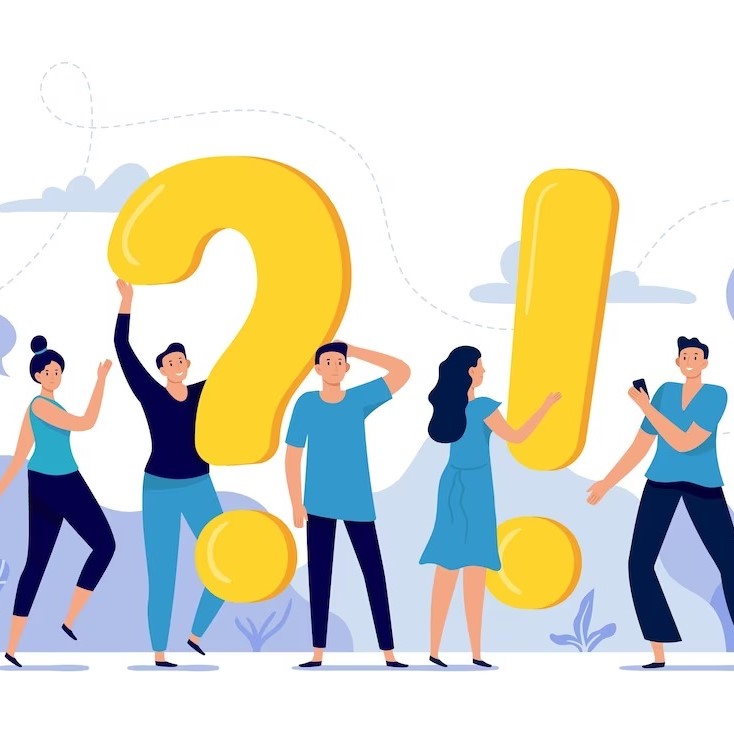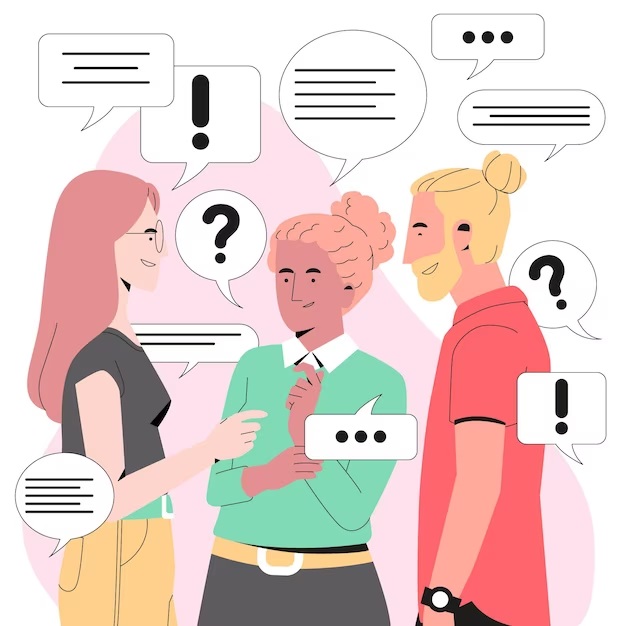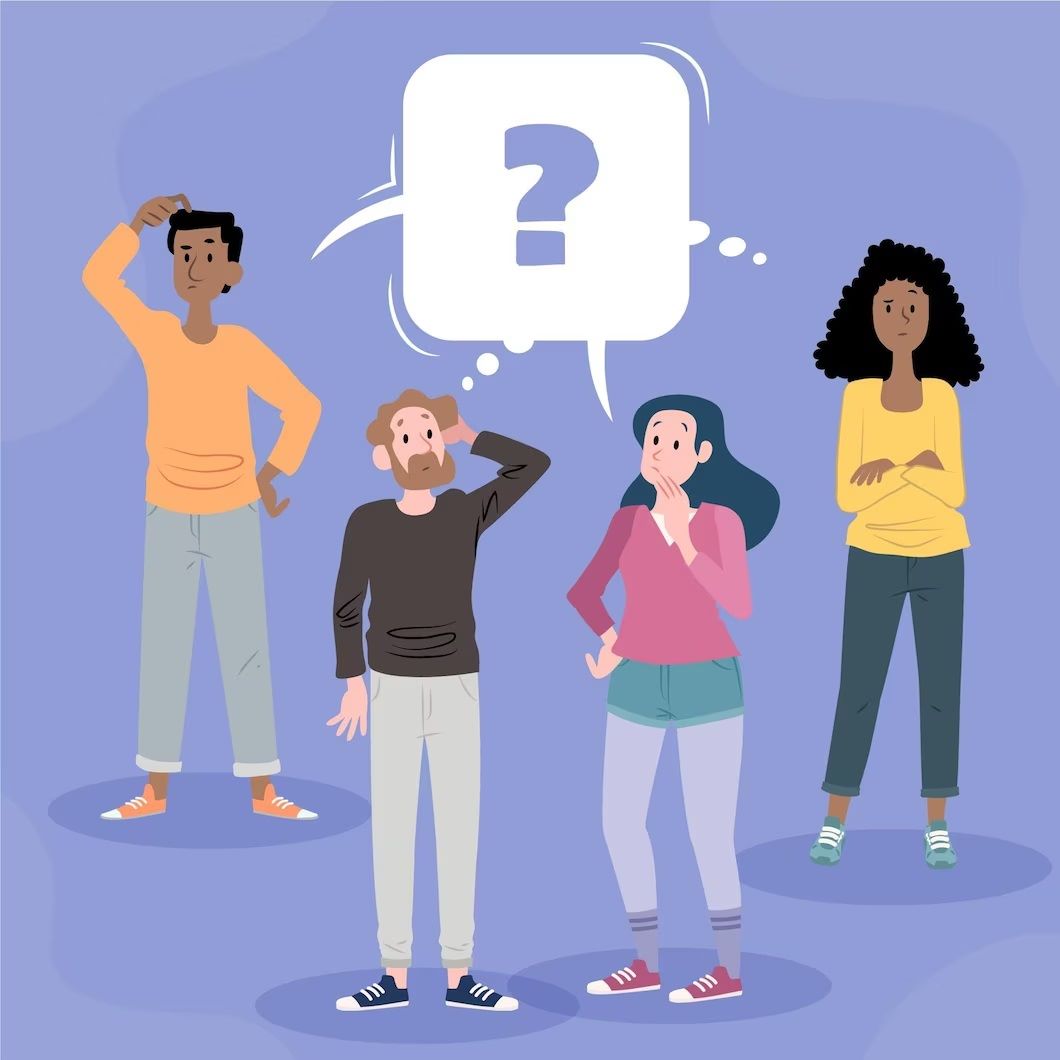How Open-Ended Questions Foster Genuine Conversations
How Open-Ended Questions Foster Genuine Conversations
Open-ended questions play a crucial role in fostering genuine conversations. Unlike closed questions, which can be answered with a simple yes or no, open-ended questions encourage the speaker to elaborate and share more information. They also demonstrate a deeper interest in the other person's thoughts and feelings, which can help to build trust and rapport. By asking open-ended questions, you signal that you are truly interested in what the other person has to say and that you value their perspective.
Another benefit of open-ended questions is that they can help to reveal insights and perspectives that might not be evident otherwise. When someone is given the space to answer a question in their own words and in as much detail as they like, they may uncover insights that they have never put into words before. This can be particularly helpful in situations where you are trying to understand a complex problem or issue from multiple angles. By asking open-ended questions, you can tap into a deeper well of knowledge and expertise than you might through closed questions alone.
Of course, asking open-ended questions is not always easy. It requires a willingness to listen without judgment and an openness to hearing perspectives that might be different from your own. It also requires a certain level of skill and practice to ask open-ended questions that are both engaging and effective. But the rewards of fostering genuine conversations through open-ended questions are significant: increased trust, better communication, and more nuanced understanding of the issues at hand. So next time you find yourself in a conversation, try asking questions that start with 'how' or 'what' instead of 'yes' or 'no.' You might be surprised at what you learn.
The Benefits of Open-Ended Questions
Open-ended questions are an essential tool in any discussion or interview. They encourage exploration, creativity and curiosity, paving the way for deeper insights and greater understanding. Unlike closed questions, which limit the response and force the respondent to choose between a limited set of options, open-ended questions provide the opportunity for the respondent to express themselves freely, leading to rich and varied responses. Open-ended questions are particularly useful in group discussions, brainstorming sessions, and problem-solving processes, where a diverse range of perspectives and ideas are valuable.
One of the most significant benefits of open-ended questions is their ability to promote critical thinking. When faced with an open-ended question, respondents are called upon to think deeply about their experiences, beliefs, and attitudes, and to express them in a clear and concise manner. The process of answering an open-ended question forces the respondent to consider a range of factors, such as context, personal values, and motivations, all of which can lead to new insights and ideas. This, in turn, encourages greater engagement in the discussion, as respondents are more likely to feel invested in the conversation.
Another benefit of open-ended questions is their ability to foster collaboration and empathy. Because open-ended questions encourage the expression of personal experiences and viewpoints, respondents are more likely to feel heard and understood. This creates a sense of psychological safety and trust in the group, which can lead to increased collaboration and the development of new ideas. Open-ended questions also invite empathy and understanding, as respondents are encouraged to consider the experiences of others and to express their own experiences in a non-judgmental, non-confrontational way. As a result, open-ended questions can promote a more inclusive and supportive environment, where everyone's voice is heard and valued.
The Power of Asking the Right Questions
Asking the right questions is essential to success in many aspects of life, including business, relationships, and personal growth. The questions we ask ourselves and others can help us gain clarity, solve problems, and make important decisions. However, not all questions are created equal. The power of a question lies in its ability to unlock valuable information and insights. This means that we need to ask well-crafted questions that are relevant, thought-provoking, and open-ended. By doing so, we can tap into the wisdom and knowledge that lies within us and those around us.
One of the key benefits of asking the right questions is that it can help us avoid making assumptions and jumping to conclusions. By asking questions, we can get a better understanding of a situation or person, without relying on our own biases and preconceptions. This can lead to greater empathy, compassion, and understanding in our relationships, as well as better decision making in our careers. Additionally, asking questions can help us stay curious and open-minded, which are important qualities for personal growth and lifelong learning.
While asking the right questions can be challenging, it is a skill that can be developed with practice. Some tips for asking effective questions include being specific, using open-ended questions, listening actively, and following up with additional questions when necessary. By asking thoughtful and relevant questions, we can deepen our understanding of ourselves and the world around us, and ultimately achieve greater success and fulfillment in our lives.
Learning to Develop Open-Ended Questions
Open-ended questions are a valuable tool in any learning environment. Unlike closed-ended questions, which have a finite number of answers, open-ended questions encourage critical thinking and allow for a broad range of possible responses. Developing the ability to ask open-ended questions is an essential skill for educators, as it enables them to facilitate meaningful discussions and guide students toward deeper understanding of complex concepts.
To develop open-ended questions, it's important to start with a clear understanding of the learning objectives for the lesson or unit. This allows educators to create questions that are tailored to the specific content and skills they are trying to teach. It's also helpful to consider the age and experience level of the students, as well as any cultural or linguistic differences that may impact the way they process information. By keeping these factors in mind, educators can craft questions that are both challenging and accessible.
Another key element of developing open-ended questions is understanding the difference between closed-ended and open-ended questions. Closed-ended questions typically have a yes/no or multiple-choice answer, and are often used to confirm or test for factual knowledge. Open-ended questions, on the other hand, ask students to reflect, analyze, and synthesize information, and typically have a variety of possible answers. By focusing on questions that require higher-level thinking, educators can help students develop critical thinking and problem-solving skills that will serve them well throughout their academic and professional careers.
How to Incorporate Open-Ended Questions into Conversation
Open-ended questions are a fantastic way to encourage conversation and gain a better understanding of others. Unlike closed-ended questions that typically only require a yes or no answer, open-ended questions prompt individuals to elaborate on their thoughts and feelings. Incorporating open-ended questions into conversation can be especially helpful in professional settings such as job interviews, networking events, and sales meetings. Not only do open-ended questions foster engagement, but they also allow for deeper connections to be formed.
When incorporating open-ended questions into conversation, it's important to consider your tone and body language. The way in which you ask the question can greatly influence the response you receive. It's important to ask open-ended questions in a non-judgmental and approachable manner to make the other person feel comfortable opening up. Additionally, take note of body language, making sure that you are presenting yourself in an open and welcoming way.
Another key aspect of incorporating open-ended questions into conversation is active listening. When someone responds to your open-ended question, make sure to listen intently to their answer. Avoid interrupting or dismissing their thoughts and instead, ask follow-up questions to show that you are interested and engaged. This technique not only helps build rapport and trust but also encourages individuals to feel valued and heard.
Advantages of Open-Ended Questions in Interactions
Open-ended questions are an excellent way to encourage interaction between individuals. Unlike close-ended questions, open-ended questions allow for more elaboration, clarification, and depth of discussion. This is because open-ended questions provide a greater range of potential responses that can prompt individuals to express their ideas, feelings, and opinions in more detail. This leads to greater openness and understanding between individuals.
In addition, open-ended questions can also provide insights into individual perspectives and experiences. By asking individuals to share their personal experiences and opinions, open-ended questions encourage individuals to reflect on their own beliefs and values, which can lead to greater self-awareness and understanding. This self-reflection can often lead to improved communication between individuals and a greater understanding of the perspectives of others. Open-ended questions can also be useful in facilitating the sharing of knowledge and ideas between individuals, which can lead to more innovative solutions and increased collaboration.
Overall, open-ended questions are a valuable tool in facilitating interactions between individuals. They provide a range of potential responses and encourage deeper reflection and self-awareness, which can lead to improved communication, understanding, and collaboration. By using open-ended questions, individuals can build stronger relationships, gain new perspectives, and achieve more successful outcomes in a variety of settings.
Fostering Genuine Conversation through Open-Ended Questions
Open-ended questions are the perfect tool for fostering genuine conversation between individuals. Unlike closed-ended questions which require simple, one word answers, open-ended questions allow the respondent to answer at length and express their thoughts and feelings in greater detail. This facilitates a deeper conversation and helps both parties to gain a better understanding of one another.
Encouraging open-ended questions requires a certain level of skill and experience. Individuals who are well versed in effective communication techniques understand how to ask questions that provoke thoughtful responses. Open-ended questions are typically used in settings where individuals are interested in learning more about each other such as in interpersonal relationships and business networking events. By asking open-ended questions, individuals can establish a deeper connection with others and build more meaningful relationships in both their personal and professional lives.
Effective communication is essential in all aspects of life. By fostering genuine conversation through open-ended questions, individuals can improve their communication skills and build stronger relationships with others. Whether in personal or professional settings, open-ended questions are a crucial tool for establishing deeper connections and understanding the thoughts and feelings of those around us.
Open-Ended Questions that Promote Deeper Conversations
Open-ended questions are a powerful tool that can help promote deeper conversations. These questions are designed to encourage the other person to share more about their thoughts, ideas, and feelings, rather than just giving a simple yes or no answer. By asking open-ended questions, you can gain a deeper understanding of the other person's perspective, which can help build stronger relationships based on mutual respect and understanding.
Some examples of open-ended questions that can promote deeper conversations include, 'What motivates you?', 'How do you approach solving problems?', 'What are some of the biggest challenges you've faced?', and 'What would you do differently if you had the chance?'. These questions require the other person to reflect on their own experiences, opinions, and beliefs, which can lead to more meaningful and engaging conversations. By actively listening to their responses, you can demonstrate that you value their perspective and are committed to building a stronger connection with them.
In addition to promoting deeper conversations, open-ended questions can also help you to become a better problem solver and critical thinker. By asking thoughtful, open-ended questions, you can challenge your assumptions and understand the root causes of a problem more effectively. This can lead to more effective solutions and a more nuanced understanding of complex issues. Whether you are trying to build deeper relationships or solve complex problems, asking open-ended questions is a powerful way to achieve your goals and become a better communicator.
The Impact of Open-Ended Questions on Conversation
Open-ended questions have a significant impact on conversation, as they allow for more meaningful and thought-provoking discussions to take place. Unlike closed-ended questions, which require a simple yes or no answer, open-ended questions encourage the respondent to elaborate on their thoughts and feelings. This creates a more dynamic and interactive conversation, where all participants can fully engage with the topic at hand.
Furthermore, open-ended questions facilitate deeper levels of understanding and insight by encouraging individuals to reflect on their own experiences and perspectives. This helps to build empathy and understanding, as people are able to see and appreciate different viewpoints. Open-ended questions can also help to break down barriers and promote inclusivity, as they allow everyone to have a voice and share their unique perspective.
In addition, open-ended questions can help to foster creativity and innovation, by inspiring individuals to think outside of the box and challenge conventional wisdom. By encouraging people to explore different ideas and possibilities, open-ended questions can lead to new discoveries and breakthroughs. This can be particularly valuable in areas such as business or research, where innovation and creativity are highly valued and sought after.
Using Open-Ended Questions to Encourage Participation
Open-ended questions are a powerful tool that can be used to facilitate meaningful conversations and encourage participation. When used effectively, open-ended questions can help to generate new ideas, uncover hidden perspectives, and build deeper connections between people. Unlike closed-ended questions, which can be answered with a simple yes or no, open-ended questions require thoughtful reflection and often lead to more extensive responses. By asking open-ended questions, you are inviting others to share their thoughts and feelings in a way that is authentic and meaningful.
One of the key benefits of using open-ended questions is that they encourage active listening and collaboration. When people are asked open-ended questions, they are forced to engage with the conversation actively. This engagement can help participants to focus on the present moment, eliminate distractions, and create a shared sense of purpose. Open-ended questions can also inspire creativity and innovation by sparking new ideas and perspectives. By inviting participants to share their thoughts and ideas freely, you create an environment that nurtures discovery and exploration.
Effective communication is essential for building strong relationships, resolving conflict, and accomplishing goals. Open-ended questions can help to facilitate communication by creating a safe, non-judgmental space for dialogue. When people are asked open-ended questions, they feel valued and respected, and they are more likely to participate fully in the conversation. Open-ended questions can also help to build trust by encouraging transparency and honesty. When people feel free to express themselves honestly, they are more likely to trust others and build meaningful relationships. By incorporating open-ended questions into your conversations, you can create a more collaborative, communicative, and supportive environment.
The Value of Open-Ended Questions in Communication
Open-ended questions are a powerful tool in communication. These types of questions aren’t just designed to extract specific pieces of information, but instead, they create an open dialogue that allows both parties to explore ideas and thoughts in a deeper and less rigid manner. Unlike closed questions, which typically require a simple yes or no response, open-ended questions can lead to more complex and nuanced responses that can be far more enlightening.
Another benefit of open-ended questions is that they promote active listening. When someone asks an open-ended question, they have to listen intently to the answer and engage with it in order to continue the conversation. On the flip side, open-ended questions demand that the responder dig deeper into their own thoughts and consider their response carefully, as they are required to come up with a thoughtful answer that isn’t just a one-word response. Through this process, both parties develop greater empathy for each other’s point of view, which can lead to more effective communication overall.
Lastly, open-ended questions have a broader scope of potential answers. Because they’re not limited to a single idea or response, they have the capacity to uncover a variety of insights and perspectives. This can help generate more creative and nuanced solutions to problems, as well as providing opportunities for more in-depth discussions. By providing an opening for more diverse conversations, open-ended questions allow communication to flow organically and ultimately lead to a more thorough understanding between conversation participants.
Developing Open-Ended Questions for Improved Engagement
Open-ended questions have been found to be effective in improving engagement levels. They are the kind of questions that don't have a right or wrong answer and require more thought and reflection to answer. By posing these questions, you encourage your audience to think critically and engage with your message. This can lead to deeper insight and meaningful conversations. When creating open-ended questions, try to avoid yes or no questions or leading questions that can guide the respondent towards a specific answer.
To develop open-ended questions, start by identifying the key messages you want to convey. What are the main points you want your audience to take away from your message? Then, consider how you can frame those points as open-ended questions that encourage reflection and discussion. You can also consider using hypothetical scenarios or examples to illustrate your point and encourage your audience to think creatively.
In addition to improving engagement, open-ended questions can also allow you to gather more comprehensive feedback. When respondents are encouraged to answer without restriction, they may be more likely to reveal more detailed insights and perspectives. This can help you to better understand your audience and their needs, which can ultimately lead to stronger relationships and improved outcomes. By developing open-ended questions, you make it clear that you value your audience's input and are committed to hearing their thoughts and ideas.
Curiosity-Inspiring Open-Ended Questions in Conversation
Curiosity-inspiring open-ended questions in conversation are a powerful tool for building deeper connections with others. These types of questions encourage meaningful dialogue and exploration of personal experiences, values, and beliefs. By asking open-ended questions, we allow space for our communication partners to think more deeply, reflect on their experiences, and offer insights that they may otherwise have never considered.
To create effective open-ended questions, it is important to avoid those that can be answered with a simple “yes” or “no”. Instead, focus on questions that start with “what”, “how”, “why”, and “tell me about”. For example, rather than asking “Did you enjoy your vacation?”, you can ask “What was the most memorable experience you had on your vacation?”. By reframing the question in this manner, you are providing space for your conversation partner to share their experiences and engage with you on a more meaningful level.
Curiosity-inspiring open-ended questions in conversation can be used in a variety of settings, from social interactions to business meetings. When we engage with others in this way, we are promoting genuine curiosity and interest in their experiences. We are also fostering deeper connections and a greater understanding of each other’s perspectives. By being mindful of the types of questions we ask, we can create an environment of open dialogue and meaningful conversation that benefits everyone involved.



